1. Executive Summary
In support of the Food Standards Agency’s (FSA’s) wider objective of promoting healthier and more sustainable food, Ipsos UK in Northern Ireland was commissioned to conduct qualitative research to investigate food manufacturers’ engagement, views and challenges around food reformulation. Fifteen one-to-one depth interviews were conducted with food manufacturers in Northern Ireland.
Key Findings
-
Awareness of the UK Government’s guidelines on sugar, salt and calorie reduction is mixed across food manufacturers in Northern Ireland. Awareness is impacted by business size, with larger and medium-sized businesses holding more knowledge about the specific guidelines due to employing staff with more technical expertise, and working with retail sector customers who often encourage reformulation.
-
The extent to which businesses have engaged with, or are currently engaging with reformulation varies, and those who have engaged in reformulation have done so with varying success. Those who have made previous attempts to reformulate food products have faced challenges with regards to overall product quality, including changes to taste, texture or mouth feel. Motivations to reformulate are individual to each business but are largely driven by end cost of the product, exploring healthier product lines to meet consumer demand, or adhering to retail customers’ guidelines.
-
Several enablers to reformulation were identified, including perceptions of retail customer demand, perceptions of changing consumer preferences, and support and partnership working with suppliers, retail customers and experts in nutritional and technical fields.
-
It is clear that the reformulation journey for each business is individual and multi-faceted. Generally, where reformulation has taken place, there is a commercial drive underpinning reformulation efforts. Perhaps unsurprisingly, food manufacturers must consider financial viability of any significant change to their activities. Where health benefits of reformulation exist, in some cases this is secondary to increasing profit or retaining retail, wholesale, or consumer business.
-
Barriers to food reformulation vary based on business size and the types of food product manufactured. Key barriers include a perceived lack of need to reformulate any food products (for example, that foods manufactured are not suitable for reformulation); wide-ranging cost implications such as food wastage, redundant stock and purchase of new ingredients; impact on product quality and integrity; consumer acceptance; and time and resourcing challenges. The extent to which these barriers are relevant to businesses depends on the size of the business (with larger businesses more likely to have additional resource or budget to undertake reformulation), expertise within individual businesses, and individual motivations or goals to undertake reformulation.
-
Targeting guidance which aims to support businesses to include reformulation as a key business goal or priority, and increases awareness and knowledge of the UK Government guidelines, may benefit businesses of all sizes, but may be more crucial for micro and smaller-sized businesses. This may take the format of summarised written communications which signpost businesses to relevant organisations or representatives that can support with reformulation.
-
Personalised support may be useful for businesses, including connecting food manufacturers with external bodies such as local technical colleges, funding bodies and/or business support. This would mean they can access a dedicated representative with knowledge on reformulation, who can provide tailored advice based on the individual business, their business plans and manufacturing capability. Where financial support is available to enable businesses to engage in reformulation, this may particularly benefit smaller and medium-sized businesses.
2. Acknowledgements
We would like to express our sincere gratitude to all the organisations and individuals who generously gave their time to participate in this research and provided their expertise on the subject of reformulation. Your invaluable contribution made this research possible and significantly enhanced its quality.
3. Introduction
Ipsos UK in Northern Ireland was commissioned by the Food Standards Agency (FSA) in Northern Ireland to conduct a qualitative research project as part of the Making Food Better (MFB) programme, to investigate food manufacturers’ engagement, views and challenges around reformulating food to reduce calories, sugar, saturated fat and salt.
The MFB programme seeks to improve the food environment whereby consumers have access to healthier food. This programme of work supports Northern Ireland food businesses to make the food environment healthier through reformulation to reduce calories, sugar, saturated fat and salt in the food they produce, sell or serve, reducing portion size, providing nutritional information and delivering responsible promotions.
This research aligns with the FSA’s wider objective of promoting healthier and more sustainable food and complements the Making Food Better Consumer Tracker,[1] a quantitative survey with consumers in Northern Ireland that monitors perceptions of healthy eating, healthier options and reformulation, the use of traffic light labels and knowledge and understanding of the recommended daily calorie intake. Indeed, the FSA recognises that dietary health and sustainability are growing priorities for consumers in Northern Ireland.
To date, research has not been conducted with businesses to understand food reformulation. This research begins to build the evidence base with regards to views across the food manufacturing sector in Northern Ireland. The findings of this research will help to develop an in depth understanding of how the FSA can best support food businesses with food product improvement, specifically in relation to food reformulation. The findings aim to provide unique insights from the perspective of food manufacturers, and will play a key role in informing the FSA’s policy in this area.
3.1. Research objectives
The main objectives of this research were to understand Northern Ireland food manufacturers’ awareness, participation and attitudes towards healthier food reformulation, their views on front of pack nutritional labelling, and to understand how they can be best supported to partake in reformulation.
More specifically, this research project aimed to investigate the following areas with food manufacturers in Northern Ireland:
-
Awareness and understanding of the UK Government’s sugar, salt and calorie reduction guidelines;
-
Participation in reformulation (self-reported) and reasons for participating or not participating in reformulation to understand potential enablers and barriers to reformulation;
-
Support required to participate in reformulation (from FSA and in collaboration with other Government departments, external funding organisations or technical colleges);
-
Reduction of portion sizes;
-
Display of traffic light labelling on products;
-
Business priorities to understand engagement with / importance of reformulation;
-
Communication of food product improvement messaging to consumers following changes (e.g. changing ingredients; reducing calories, saturated fat, sugar and salt; increasing fibre; adding vitamins), approaches to messaging (e.g. via health claims, nutrition claims or ingredient claims) and how messaging is sourced.
4. Methodology
4.1. Methodology overview
A qualitative approach was adopted for this research using one-to-one depth interviews to gather insight on reformulation among food manufacturers in Northern Ireland. This method was chosen over a quantitative survey due to the small number of businesses available and a desire to gather in-depth information on the topic under investigation. The full methodological approach along with the limitations and challenges is detailed in Appendix F.
4.2. Sample
Data was collected from various food manufacturers with a scope for reformulation as identified through the following Standard Industry Classification (SIC) codes:
-
Manufacturing of vegetable and animal oils and fats;
-
Manufacturing of dairy products;
-
Manufacturing of grain mill products, starches and starch products;
-
Manufacturing of bakery and farinaceous (starchy) products; and,
-
Manufacturing of other food products.
The purchased sample universe consisted of 136 food manufacturers across various sectors, of which only 55 had email addresses. To boost the sample, researchers added businesses that were not included in the original sample, resulting in 134 email contacts.
4.3. Recruitment and fieldwork
The Ipsos research team managed recruitment, aiming to encourage participation from senior employees in food businesses. The research team contacted businesses by email and phone, and despite challenges in scheduling and reaching potential participants, the team persisted with follow-up attempts. The initial recruitment and fieldwork phase ran between 16th October 2023 and 23rd November 2023, resuming on 15th January 2024 following a pause for the busy Christmas period faced by businesses, and ending on 22nd March 2024. Additional efforts were made to maximise participation, including adding a full-time recruiter in January. Face-to-face recruitment was also attempted at a specialty market in Belfast, resulting in four successful interviews out of 13 eligible businesses.
4.4. Research materials
A discussion guide was created to understand food manufacturers’ awareness and understanding of the UK Government’s guidelines around reformulation, and their opinions, attitudes, barriers, and enablers related to food reformulation. The COM-B behaviour model was also used to design the discussion guide with questions to identify any processes or external drivers or barriers to reformulation as a Behaviour related to Capability, Opportunity and Motivation (see Figure 1 and Appendix F for more detail).[2] A total of 15 interviews were conducted either online or via telephone with representatives from various food manufacturers. The interview duration was around 45 minutes to accommodate busy schedules, and participants were carefully selected based on their role and knowledge of food reformulation within their organisations.
4.5. Data analysis
A case study approach was used to report research findings due to the unique nature of each business’ experience with reformulation. In that regard, all participating businesses were unique in size, operation and manufacturing activities, with some businesses taking part in reformulation while others were not currently engaging in or considering reformulation. Thematic analysis, an inductive approach seeking to identify themes from the data rather than code data into a pre-existing thematic framework, was also used to identify common themes across all interviews. The COM-B framework and the Theoretical Domains Framework (TDF) guided data interpretation.
4.6. Ethical considerations
All participants were informed about the research and consented to participate. They were assured their responses would be kept confidential and anonymised. Additionally, they were reminded that participation was voluntary, and they could withdraw at any time.
5. Research findings
This chapter provides an overview of the research findings, and includes individual case studies for each business who participated in the study.
This has been selected as the most appropriate approach to present the findings, to allow for any unique motivators and challenges to be captured for specific business cases. This section first presents a number of overarching themes that emerged from the research and analysis using the COM-B framework where appropriate.
Supporting evidence in the form of quotes from food manufacturers, are provided throughout the case studies in section 5.5. An overview of the business profiles of the individual case studies can be found in Appendix G.
5.1. Awareness and understanding of the UK Government’s sugar, salt and calorie guidelines
Awareness of the UK Government’s guidelines on sugar, salt and calorie reduction is mixed across food manufacturers in Northern Ireland. Generally, businesses are aware that the guidelines are in place but familiarity with the guidelines varies. This variation appears to be driven by several factors.
Business size appears to impact awareness levels to some extent, with larger and medium-sized businesses holding more knowledge about the specific guidelines. They are also more likely to have specialist teams working on product development and technical elements of food production, as they typically manufacture a wider range of products which are subject to quality control and testing.
Larger-sized businesses who supply their manufactured products to the retail sector (including supermarkets) or hospitality sector, may also hold a more in-depth understanding of the guidelines due to the requirements set out by their customers. Food manufacturers may be required or encouraged to engage in reformulation to adhere to their retail customer requirements, and as such, there has been a commercial drive for these businesses to understand the UK Government guidelines, which seem to be considered and utilised more widely by the retail sector they supply to.
Within larger organisations, awareness among the representatives interviewed also varies depending on their job role within the business, with some noting that colleagues involved in the more technical side of the business would hold more specific knowledge on guidelines relating to different nutritional components.
Generally, smaller and micro-sized enterprises are less familiar with the UK Government guidelines, as they may not have considered reformulation and are likely to have a much smaller workforce. Therefore, they tend to have competing priorities to consider with the time and resource available to the business.
While there is general awareness among businesses that guidelines exist around the reduction of salt, sugar and calories, familiarity with specific recommended values of these nutrients is relatively low among the representatives interviewed. It may be the case however, that individuals within the business who are closer to the technical elements of food production, hold more knowledge on recommended nutrient values.
5.2. Participation in food reformulation
Similar to awareness levels on the UK Government guidelines, the extent to which businesses have engaged with, or are currently engaging with reformulation, varies.
Generally, few businesses in this research have participated in reformulation. Among businesses who have engaged in reformulation, products have been reformulated to reduce sugar, salt and calories with varying success. Those who have made previous attempts to reformulate food products have faced challenges with regards to overall product quality, including changes to taste, texture or mouth feel. Successful reformulation is largely linked to the type of food product being reformulated and the scale of operation of any individual business. Where a food manufacturer has a larger operation or a wider range of food products, reformulation is more likely to be successful.
Motivations for reformulation are mixed and individual to each business, but include factors such as reducing overall cost to the consumer through the cost-of-living crisis, exploring ‘healthier’ food product alternatives in line with consumer demand, adhering to guidelines provided by retail and wholesale customers, and attempting to innovate in a particular product category to offer healthier alternatives to popular food items.
Reformulation activities that have been explored more relate to the reduction of specific nutrient categories such as salt and sugar, rather than changes to portion size. Across food manufacturers, there is a general reluctance to reduce portion size due to the perception that consumers will be dissatisfied or feel they are no longer receiving value-for-money. In some instances, changing the portion size of a product is not perceived to have any meaningful health benefit to the consumer, depending on the type of product a business sells. Furthermore, there is a sense among some businesses that changing portion sizes may not change overall consumer food behaviours and that it is the responsibility of the consumer to decide if they want to purchase a particular food product.
A lack of legislation around reformulation to reduce levels of salt, sugar, saturated fat and calories in food products, is perceived by some businesses as a reason not to focus efforts on engaging in reformulation at this time. Without a legal requirement to do so, some businesses are unwilling to prioritise reformulation due to the time, resource and costs required.
Further detail on individual business reformulation journeys is explored later in this chapter within the individual case studies.
5.3. Key enablers and barriers to reformulation
A number of themes were identified in relation to enablers and barriers to reformulation, using the COM-B model to determine the potential influence of each of the domains (Capability, Opportunity, and Motivation) on food reformulation engagement. Figure 2 presents an overall summary of the key enablers and barriers under the COM-B framework, which are then explored further in the next section.
Please note that the arrows in Figure 2 denote the relationships between business size, knowledge, and technical skill. While each of these three elements relate to a business’ capability to undertake reformulation, business size directly influences the extent to which a business may have the knowledge or technical skill required to undertake reformulation.
5.3.1. Key enablers to food reformulation
Enablers to food reformulation include perceptions of retail customer demand, perceptions of changing consumer preferences in the general population, and support and partnership working with suppliers, retail customers and experts in nutritional and technical fields.
Perceived market demand for reformulated products
The main drivers of food reformulation tend to be centred around retail customer demand and therefore a perceived ‘need’ to reformulate existing product lines. As highlighted above, some larger-sized manufacturers are contractually required by retail or wholesale customers to reformulate certain food products, and do so to retain business and ensure profitable growth.
For some businesses, reformulation would be considered in the future if they were required to do so to retain retail or wholesale customers, and in some cases if there were financial supports and technical guidance available.
Perceptions of changing consumer preferences
Consumer preferences for certain product categories is another key consideration. Some businesses noted that they have attempted to reformulate their products to meet consumer demand for lower calorie or higher protein options, but with limited success. There is a perception among some businesses that products which are lower calorie or higher in protein are growing in popularity among consumers, particularly those who are more health focused. However, this type of reformulation is only perceived as relevant to foods such as pre-prepared meals or foods which are not considered by consumers to be ‘treat foods’, and therefore, manufacturers with food products that are typically higher in sugar or saturated fats generally do not cite consumer demand for heathier products as a motivator for reformulation, as they perceive those purchasing ‘treat foods’ to not desire healthier alternatives.
Partnership working with relevant organisations
Working in partnership with suppliers, retail customers – and for some businesses, colleges or food technicians and nutritional specialists – is key to reformulation success among those who have identified a need or desire to reformulate a product. As businesses often require additional knowledge or expertise to support reformulation efforts, access to organisations who can share this knowledge is crucial.
Additionally, in cases where it is not possible to perform reformulation or food trials in-house, the access to the appropriate physical environment of a manufacturing facility can influence a business’ opportunity to reformulate food products.
5.3.2. Key barriers to food reformulation
There are several barriers to food reformulation, which vary based on business size and the types of food product manufactured. Key barriers include a perceived lack of need to reformulate any food products (for example, a perception that foods manufactured are not suitable for reformulation); wide-ranging cost implications; product quality and integrity; consumer acceptance; and time and resourcing challenges.
Perceived lack of need to reformulate
Among manufacturers who do not perceive a need to reformulate their food products, this is often due to opposing beliefs about the healthiness of their primary product. For example, businesses who believe they sell a product or product lines that are relatively healthy, and can be considered to be comprised of whole, fresh and natural ingredients that are naturally lower in added sugars, salt and saturated fat, do not feel that reformulation is necessary or feasible for such products. This is tied to perceptions that the companies’ values and goals may be synonymous with healthy eating, and therefore, reformulation efforts would be fruitless.
Conversely, manufacturers of food products which are naturally higher in sugar, saturated fat and calories struggle to understand how reformulation could be achieved without impacting the overall appeal of the product, or changing the product substantially. These types of businesses often note that their key products may be considered a ‘treat’, and it is well understood that certain products are higher in sugar, fat or calories, and that it is up to the consumer to decide if they wish to buy the product as part of wider dietary choices. It is evident that some products, which could be considered less healthy, are considered more challenging to reformulate than others while ensuring the product is still appealing to consumers. Similar to perceptions that some consumers are increasingly seeking healthier alternatives, there is also a perception that foods higher in sugar, fat, and calories remain in demand in the context of consumers’ overall food preferences.
Concerns around product quality
Another barrier to reformulation is linked to business concerns around product quality and consumer acceptability. The overall quality of a product is of key importance and was a prominent theme across all manufacturers who participated in the research. Among businesses who have engaged in reformulation and those who have not, there is an acknowledgement that irrespective of the time, resource and cost required to develop and test new products, if a reformulated product does not meet the quality standards set out by the business, it will not be a viable product. Depending on the type of reformulation undertaken, changing the nutritional make-up of a product can change the taste, texture, mouth feel or shelf life of a product, all factors which may impact consumer acceptance and likelihood to purchase.
Time and resourcing challenges
Engaging in reformulation requires time commitment from individuals in the business which takes resource away from other business activities. Additionally, some businesses including medium and larger sized businesses, note that they do not have the opportunity to focus on reformulation due to the ‘down time’ that would be required to do so, which would take away from important and profitable activities elsewhere in the business. ‘Down time’ to explore reformulation may redistribute staff resource to reformulation trials, for example, which are not guaranteed to produce a successful result.
Furthermore, depending on the business size and their manufacturing operations, the expertise required to successfully execute reformulation may be limited. Where a business does employ staff who are skilled in the relevant technical requirements, there may still be a resourcing or cost barrier to utilising this expertise for reformulation. This is likely to be a more prominent issue for smaller and micro-sized businesses who employ fewer staff members, however, there is a general sense across food manufacturers that time is precious and often limited.
Cost considerations
Finally, cost is a significant barrier to reformulation and is noted across all food manufacturing sectors in this research. There are various cost considerations across a reformulation journey that a business takes into account when assessing if reformulation is feasible. Research and development into a new or reformulated product can have both a time and resource cost (as outlined in the previous section) and also a financial cost. Product trials can be costly due to food wastage, purchase of new ingredients (including more expensive ingredient alternatives) and redundant stock which may no longer be sold if changing to a new product. Reprinting of labels or packaging can also be a significant cost.
For some product reformulations, businesses would require new machinery or equipment to undertake a specific manufacturing process, which is extremely costly to the business without additional financial support. This kind of financial outlay can deter businesses, particularly medium and smaller-sized businesses, from engaging in reformulation.
5.4. Views on support required to participate in reformulation
Larger-sized enterprises seem to be more knowledgeable on available support, but in some cases lack time or resources to further explore reformulation and utilise support they have identified.
There is appetite among businesses for information on reformulation that is easy to understand and breaks down or summarises the UK Government guidelines in a digestible format. This is particularly important for businesses who have a busy time schedule as some highlight that current documentation can be lengthy, and key information can be difficult to locate in relation to specific reduction guidelines.
Enhanced technical support and guidance would be welcomed, particularly where a business lacks in house technical departments or expertise. While colleges, universities, food laboratories and technicians have been cited as valuable sources of support for some businesses, it appears that across food manufacturing sectors, there is mixed awareness on which organisations or resources would be most useful to engage with to support reformulation.
Engagement with the FSA, including online resources and contact with individuals is also considered to be very helpful. Some business representatives indicated that they have regular contact with the FSA or have a contact that they can reach out to for guidance where needed. Other businesses highlight that where they have key personnel who are focused on the technical aspects of food development, they regularly use the FSA website for information and to keep up-to-date with any guidance.
5.5. Case study overview
The remainder of this chapter presents individual case studies for each of the 15 business interviews conducted. Please note that in some cases, due to the business size, resource and skills, and the extent to which businesses feel that reformulation is possible for the products they manufacture, the level of detail in each case study varies. It is also important to note that care has been taken with regards to the inclusion of information or quotes which may potentially identify an individual business, to ensure anonymity.
It is also impotant to note that while all key areas in the discussion guide were covered, where a business has been unable to fully discuss an area of reformulation or has not shared their views on an element, this has been omitted from the case study. For example, some questions on experiences with reformulation were only asked to businesses who indicated they had previously, or currently undertake reformulation.
Please note, the reformulation status of each business has been listed under one of the following three categories:
-
Currently reformulating products (case studies 1-3, colour code green);
-
Previously reformulated (case studies 4-9, colour code blue);
-
Not currently reformulating products (case studies 10-15, colour code purple).
Individual case studies have been colour coded according to the above three categories.
Please note, where a business has “previously reformulated”, in some cases reformulation attempts did not progress past trial stages and may not have resulted in a reformulated product going to market. Further detail is provided within each case study.
6. Discussion
The findings from this research provide key insights into the views, engagement and challenges around reformulation of food products among food manufacturers in Northern Ireland.
Overall, awareness of the UK Government guidelines in relation to the reduction of salt, sugar and calories is high, however, individual knowledge of the guidelines and specific recommendations varies across businesses. While the benefits of reformulation of certain food products (particularly those higher in salt, sugar and calories) is well understood in relation to the potential health benefits, the execution of food reformulation is more complex.
Few businesses involved in this research have engaged in reformulation activities, in part due to variation in the knowledge and necessary skills to undertake food reformulation. Medium and larger-sized enterprises are more likely to have explored or undertaken food reformulation, as they often employ a larger number of personnel, including in some cases, technical experts or those with a higher level of nutritional expertise. Smaller and micro-sized businesses generally lack capability for reformulation with regards to the skills or expertise required, often managed by specialist personnel.
Where a business lacks the skills or capabilities to undertake reformulation in-house, it seems that medium and larger-sized enterprises are more knowledgeable on which organisations to seek support from to assist reformulation efforts. This may be for nutritional guidance, advice on specific reformulation processes, or for technical assistance with food trials or testing.
Cost has been identified as a key consideration and barrier to reformulation across businesses, predominantly driven by concerns over buying expensive new raw ingredients, product wastage, research or input from nutritional experts, redundant stock and design and production of new labelling or packaging. Unless businesses are required to reformulate by law or through demand from retail or wholesale customers, they are hesitant to invest in reformulation due to the perceived high cost.
Further barriers to reformulation include a lack of available time to dedicate to reformulation activities, available staff resource, and access to the relevant environments required in some instances for reformulation (for example, manufacturing equipment, machinery and laboratory facilities). In some cases, businesses simply do not have the financial means to engage in reformulation as it could have a detrimental impact on the business financially. Some businesses are not motivated to invest time and resource in reformulation due to the perception of risk or potential loss to the business for a gain or benefit that is not guaranteed, for example if a reformulated product does not move past the trial stage, or is unsuccessful at market.
While limited financial support or incentive to reformulate may exist, some businesses discussed grants that had once been available through Invest NI or Intertrade Ireland. Any future financial support made available to businesses may encourage food manufacturers to explore how reformulation could be undertaken within their own business.
It is clear that the reformulation journey for each business is individual and mutli-faceted. As such, there are varying levels of motivation across food manufacturers when it comes to current or future reformulation plans as part of wider business goals or priorities.
Generally, where reformulation has taken place, there is a commercial drive underpinning reformulation efforts. Perhaps unsurprisingly, food manufacturers must consider financial viability of any significant change to their activities. Where health benefits of reformulation exist, in some cases this is secondary to increasing profit or retaining retail, wholesale, or consumer business.
Limitations of the research
The research team faced some challenges during this project. It was vital to ensure a broad range of perspectives were heard from different food manufacturers to avoid bias in the interviews. While every effort was made to achieve this, the application of quotas to achieve a fully representative spread of businesses was not possible. Therefore, caution should be taken when extrapolating the findings to other food manufacturers in Northern Ireland.
The number of contact details within the sample was limited, with an email address for only 55 out of the 136 companies for initiating contact through an email invitation. In order to boost the number of food manufacturers receiving the email invite, the Ipsos team conducted a desk research exercise to secure additional email addresses. The sample was further boosted through face-to-face recruitment of businesses who met the inclusion criteria for the research.
Due to time constraints of the business participants and other commitments, there was some attrition as participants who had originally agreed to take part, were no longer available after follow-up calls were made. In addition to general recruitment challenges, additional time was required by the research team to employ efforts to replace any businesses who did not proceed to interview after initial contact.
Recommendations for encouraging reformulation
Individual businesses face unique issues in relation to food reformulation engagement, and as such, determining the barriers and enablers which are most prominent across all businesses is challenging.
Appendix F presents the COM-B behavioural framework and analysis of findings, with reference to potential interventions or policy categories which may be considered to encourage reformulation in the future. It is clear that Capability, Opportunity and Motivation drivers and barriers to reformulation exist, and these vary among individual businesses in relation to factors such as business size and operations.
Targeting guidance which aims to support businesses to include reformulation as a key business goal or priority may benefit businesses of all sizes. Targeting factors which influence awareness and knowledge will also benefit businesses, but may be more crucial for micro and smaller-sized businesses who generally have lower awareness of the UK Government guidelines.
To overcome inconsistencies in knowledge, skill and technical capability, it may be beneficial for food manufacturers in Northern Ireland to receive simplified or summarised written communications on the UK Government guidelines, the benefits of reformulation, any nutritional or technical factors which may need to be taken into consideration, as well as clear signposting to the relevant organisations or representatives that can support in this area. Indeed, this level of support has been identified as potentially valuable by food manufacturers, through their participation in this research.
To overcome time challenges which exist across the food manufacturing sector, it may be important to consider the need for personalised support. It may be useful to connect food manufacturers with external bodies such as local technical colleges, funding bodies and/or business support so they can access a dedicated representative with knowledge on reformulation, who can provide tailored advice based on the individual business, their business plans and manufacturing capability.
Where financial support is available to enable businesses to engage in reformulation, this may particularly benefit smaller and medium-sized businesses, who are less likely to have capital to invest in reformulation.
The findings of this research, in conjunction with the results of the Making Food Better Consumer Tracker Survey, may be explored in tandem to better understand where there are commonalities in the views of the general public and the views of businesses in relation to ‘healthier food products’ or reformulated versions of standard food products.
Making Food Better Consumer Tracker 2023. https://www.food.gov.uk/research/consumer-interests-aka-wider-consumer-interests/making-food-better-tracker-survey-2023
Michie, S., Atkins, L., & West, R. (2014). The behaviour change wheel. [PDF]. A guide to designing interventions, 1, pp. 1003-1010.



.png)
.png)

.png)
.png)
.png)
.png)
.png)
.png)
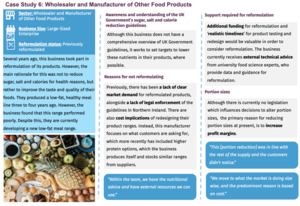
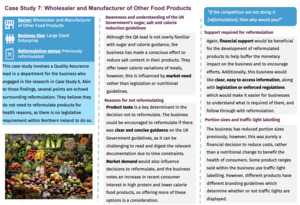

.png)
.png)
.png)
.png)

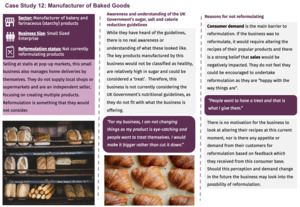
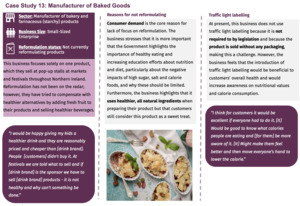
.png)
.png)
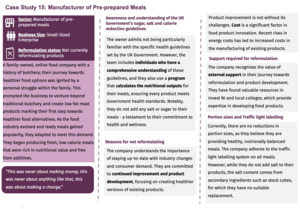


.png)
.png)
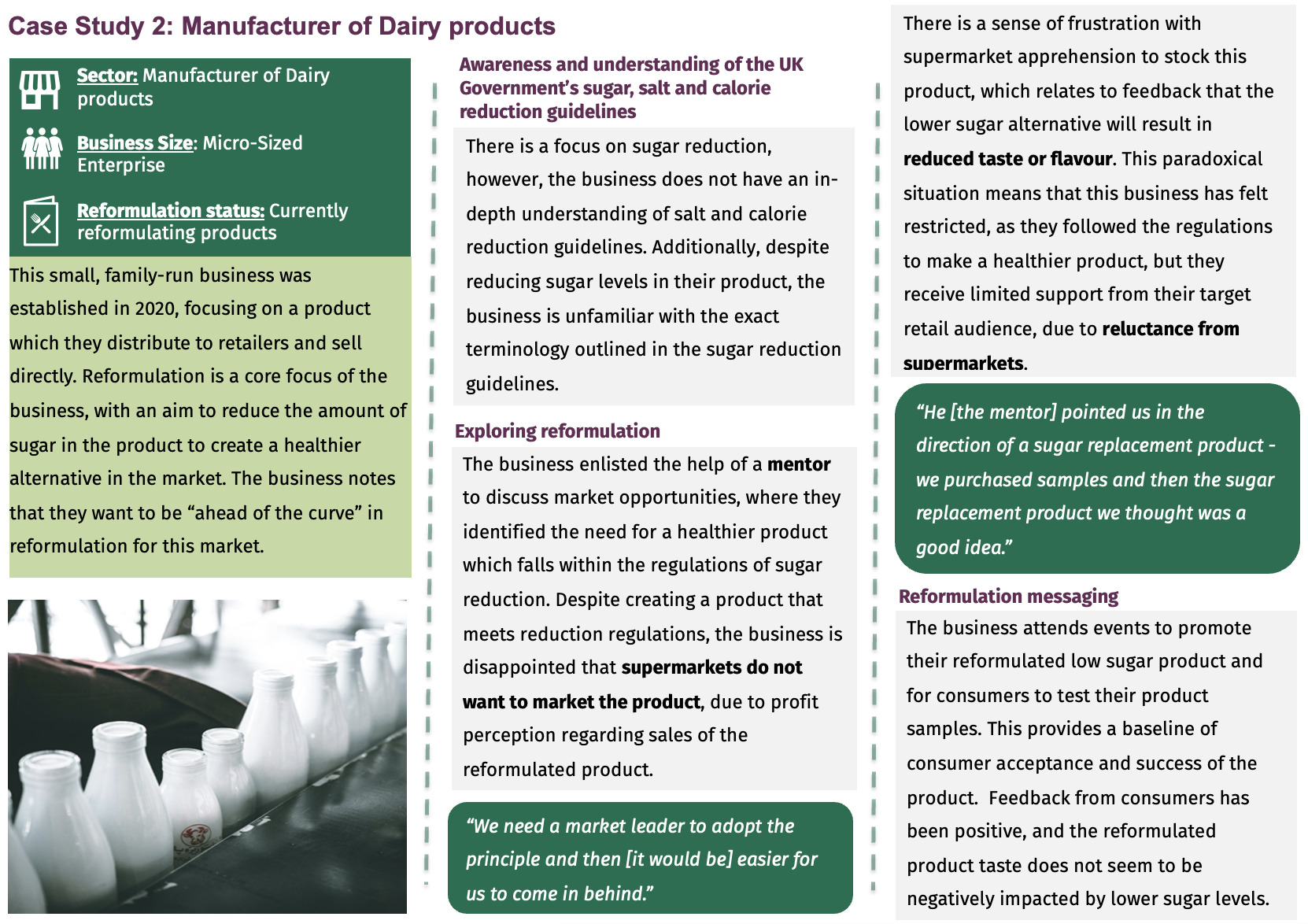
.png)
.png)
.png)
.png)
.png)
.png)



.png)
.png)
.png)
.png)



.png)
.png)
